This February and March, we’re taking a look at the 1995 to 1996 season of Star Trek, including Star Trek: Deep Space Nine and Star Trek: Voyager. Check back daily Tuesday through Friday for the latest review.
Rules of Engagement is that old Star Trek standard: the trial episode.
The franchise has never really had a lot of luck with the format over the years. The Menagerie, Part I and The Menagerie, Part II were primarily of interest for the way that they repurposed The Cage and offered viewers a glimpse of an alternate kind of Star Trek. Later in that same first season, Court Martial was a disjointed and uneven (and even illogical) story. Later series did not fare much better; neither A Matter of Perspective nor Dax nor Ex Post Facto could be considered highlights of their seasons or their shows or the wider franchise.

Worf really doesn’t understand the proper way to lodge an objection…
However, The Measure of a Man remains the exception that proves the rule. Not only a strong episode of itself, it stands as one of the best episodes in the history of the franchise. More than that, it represented a turning point in the history of Star Trek: The Next Generation; it is perfectly reasonable to point to The Measure of a Man as the moment that The Next Generation finally delivered on its potential after almost two seasons of struggling to find a unique voice. It seems entirely possible that the franchise has been chasing that high ever since.
Unfortunately, Rules of Engagement is an example of the rule rather than the exception. It is a misguided and clumsy episode that has a number of interesting ideas that fail to coalesce into a satisfying whole.
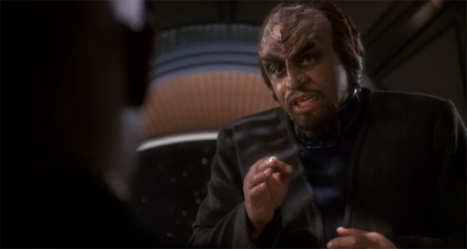
Klingon lawyered up…
Kl’awyered up, if you will.
Television has always loved legal procedures. In fact, entire generations of viewers have had their expectations of the criminal justice system set by popular dramas – from “the Perry Mason syndrome” to “the CSI effect.” These sorts of stories are popular for a reason; the framework and formula of courtroom drama lends itself to episodic storytelling, and so it seems like network television has been saturated with television shows about lawyers from its earliest days. It makes sense that Star Trek would feature a few such stories over its fifty year history.
In theory, legal procedurals make a great deal of sense. The bulk of the drama unfolds in a single room, with a fixed cast. There are real stakes. The scenes are dialogue-driven, rarely relying on practical effects. They provide something of a novelty to shows that do not usually employ the format, and give actors a chance to sink their teeth into a script. From a storytelling perspective, there is a clear structure which the writers might use to their advantage. There are expectations and rhythms, twists and turns that can be properly paced.

Worf gets dressed up to be dressed down…
However, there is a significant gap between theory and practice when it comes to these types of stories. As John Kenneth Muir argues in An Analytical Guide to Television’s Battlestar Galactica, a savvy television audience can see right through the subgenre:
The “court martial” subgenre is perhaps the most contrived of all TV clichés because it is a foregone conclusion that the series regular is innocent. Because of this knowledge, there is no tension, and the show merely wastes 48 minutes. Does any viewer truly believe that Starbuck, Riker, Dax, Worf or Paris are guilty of cold-blooded murder? It is doubtful, unless one is extremely gullible, or has never watched a television show before.
Star Trek is far too conventional a show to pull a twist like that. Even Star Trek: Deep Space Nine is not so cynical as to suggest that Worf was morally responsible for the murder of a ship full of civilians.
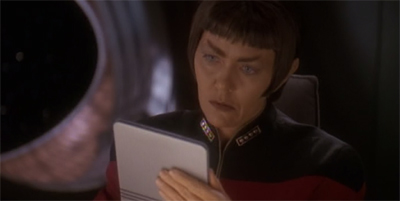
We’ll let a judge be the judge of that!
That means that trial episodes on shows like this inevitably become efforts in wiggling out of the basic set-up, providing a contrived explanation for why the main character might appear guilty but is really innocent. Riker was simply a party to suicide-by-transporter beam. Dax was keeping a secret to protect an old friend. Paris was being used to smuggle secrets to the enemy. The finer details are incidental; the audience intuitively understands that they are just a way for the show to wriggle out of a corner.
There is certainly an element of that to Rules of Engagement. Sisko is able to exonerate Worf by revealing that the incident was staged by the Klingons; that the victims of the attack died in a crash long before they were reported dead in battle. Sisko is very much pulling a rabbit out of his hate as the episode winds down. The script could just as easily suggest that the victims never existed at all, that the records had been altered, that they were all secretly spies. The actual explanation is unimportant, it just lets Worf off the hook.

A cutting retort…
This is particularly frustrating, because there really isn’t a need for all of this contrivance. As Keith R.A. DeCandido contends in his own review of the episode, the leaps in logic begin even before Worf sets foot in the courtroom:
We start with the very premise, which can’t actually have happened. The Klingons withdrew from the Khitomer Accords in The Way of the Warrior, which means the treaty between the Federation and the empire that would be the basis of the extradition has been abrogated. To make matters worse, Ch’Pok himself testifies to this fact in the hearing, so the script itself comes out and says that there’s no legal basis for the extradition request. And why would the Federation even entertain such a request, much less call for a hearing and put one of their decorated officers in a holding cell?
The Federation may not technically be at war with the Klingon Empire, but the basic premise of Rules of Engagement confirms that relations have reached a point where Klingon ships are firing on Federation ships as a matter of course.
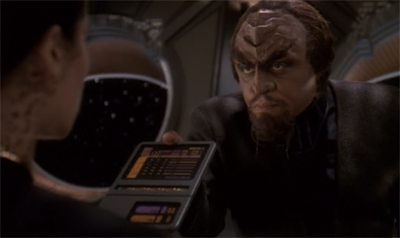
“If the sensor data fits, you can still acquit!”
In light of this, it seems highly unlikely that the Federation would so willfully hand the Klingons a propaganda victory like staging a hearing to hand Worf over for trial. Even beyond the political humiliation of the process, it seems highly unlikely that Worf could be assured a fair trial in the current climate. Even if the option of extradition were on the table, it seems highly likely that the politics around the hearing would be much more compelling than the hearing itself.
This is not to suggest that the Federation would excuse Worf of a potential war crime because it would be politically expedient. Although such concerns might apply in the real world, even Deep Space Nine is not so cynical as to suggest that the Federation would turn a blind eye to the massacre of civilians. Rules of Engagement might make more sense as an internal court martial. Even then, the episode might still be overplaying its hand. After all, the circumstances presented by Rules of Engagement are far from clear cut.

Worf gets juiced before his big fight…
Worf was commanding the Defiant as the ship was engaged in a fire fight with two Klingon ships that were attempted to attack a defenseless Cardassian convoy. There is an argument to be made that Worf was attempting to prevent a war crime, rather than instigating one. The case against Worf suggests that a Klingon freighter somehow wandered into a combat zone and was destroyed by the Defiant. “It would’ve taken only a very slight error in navigation for the ship to stray into the fight,” Odo advises Sisko.
However, this still leaves any number of questions. Even if the ship wandered into a combat zone, why would it stay there? (Or why would it continue towards a combat zone once it became clear there was a battle unfolding?) Space is big; it would have been easy enough for the ship to reverse course or go around. According to O’Brien, the fire fight had been raging for about five minutes before the incident took place. Even if sensors were not working, a cursory glance out a window would confirm what was happening.

“How come Ch’Pok doesn’t have to get dressed up?”
Even if the ship had somehow blindly stumbled into a warzone without knowing what was happening, it seems highly improbable that the ship would drop its cloak at that precise moment and in that precise location. Sisko even raises this question in conversation with Odo. “But why did he drop his cloak right in front of the Defiant?” he wonders. “Ah, that’s the question no one seems able to answer,” Odo responds. However, nobody seems too concerned about it until it (loosely) ties into the convenient deus ex machina ending.
To be fair, there are any number of possibilities. Maybe there were system failures; maybe the cloak did not work. Even allowing for these explanations, it seems highly unlikely that the freighter would appear in that exact location at that exact moment for reasons of pure chance. This is not to suggest that Worf should be excused for the destruction of a civilian freighter, but to argue that the burden of proof in this case rests with the prosecution rather than the defense.

Worf’s innocence rings out…
Worf is being accused of a crime – a very serious crime. There is a reason for the presumption of innocence, even in horrific cases like this. Based on the details as outlined by the witnesses, Ch’Pok has a lot to prove. However, Ch’Pok never really proves anything and Sisko never challenges him on them. Rules of Engagement avoids these very glaring story holes like the elephant in the room. Instead, Ch’Pok decides to argue his case based not on Worf’s actions, but on Worf’s feelings. (As distinct, legally, from Worf’s motives.)
“We Klingons are not concerned with matters of fact and circumstance,” contends Ch’Pok early in the episode. “What matters to us is what was in Worf’s heart when he gave the order to fire. Was he just a Starfleet officer doing his duty or was he a Klingon warrior reveling in the battle? That is why I am here. Because if he was a Klingon lost in the bloodlust of combat, only we can judge him, not you.” It is a nice speech, but one which makes absolutely no sense once it is unpacked.

“Your conviction is a mortal lock.”
After all, proving motive is just one facet of proving guilt. The fact that Ch’Pok seems to suggest that Worf’s motivations (and emotional state) are all that matters would seem to imply that a Klingon court would convict him based on little more. Even if the Klingon Empire could be trusted to give Worf due process by their own standards, Ch’Pok is making a fairly convincing argument for refusing to hand Worf over. Any court that would convict (or acquit) the accused based solely on “what was in [his] heart” cannot be considered fair.
Rules of Engagment allows Sisko to make this point. “We can’t put a man’s heart on trial,” Sisko contends, very reasonably. “It’s a subjective issue that cannot be reasoned in a court of law.” That should really be the end of the episode, right there. After all, Rules of Engagement makes a point to have Worf’s extradition hearing overseen by a Vulcan. More than any other Star Trek race, Vulcans are defined by their ability to set aside emotion. Admiral T’Lara should be able to see right through Ch’Pok’s line of nonsense.
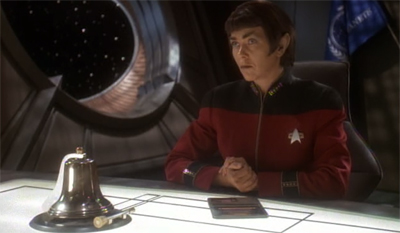
“When you said we’d get to the heart of the matter, I had assumed it was a turn of phrase…”
Of course, there are very obvious reasons why the show would opt to focus on the question of what is in Worf’s heart rather than the material details of a fictional event that will inevitably lead to Worf’s exoneration. There is a lot more drama in interrogating and examining Worf’s character than there is in dwelling on the particulars of a procedural court case. After all, cloaked Klingon ships and interstellar extradition agreements are rather esoteric; there is no real hook for contemporary audiences. However, character drama is always exciting.
There is a sense that the episode is rather clumsily trying to have its cake and eat it too. Rules of Engagement seeks to indict Worf without actually damaging character, as if trying to suggest that Worf has an edge to him that was somewhat dulled during his time on The Next Generation. Although Deep Space Nine generally uses Worf quite well, it occasionally struggles in figuring out where it can draw the line with regards to his character, how far the show can push him without pushing him over the line.

Striking accusations…
In episodes like Sons of Mogh, it seems like the production team boldly pushes Worf further than the audience might expect, only to quickly pull him back and offer the audience a false compromise. In episodes like Let He is Without Sin…, the production team gets so caught up in crossing the line that they lose all frame of reference. In episodes like Rules of Engagement, the production team try to pretend that they are crossing a line when they aren’t doing anything of the sort.
This is most obvious in the closing scene of the episode, when Worf and Sisko try to paint the whole situation as a moral failing on Worf’s part. “I did have something to prove when I took command of the convoy and I did not realise it until I stood there looking down at him, blood trickling from his mouth,” Worf confesses. “In that moment I remember thinking finally he had given me what I really wanted. A reason to attack him. And I had that same feeling when the Klingon ships first attacked. Finally, a chance for vengeance.”
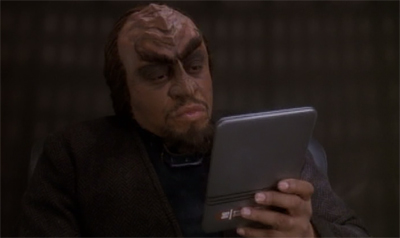
Hn. It turns out Ch’Pok CAN handle the truth…
It is a moment that does not work, for multiple reasons. Most obviously, it is not earned. Indeed, one of the bigger issues with Rules of Engagement is how marginal Worf feels for most of the episode. Sisko gets a lot more to do over the course of the episode than Worf, and the time devoted to testimony from Dax and O’Brien deny any introspective hint about what is going on inside Worf’s head. In fact, Sisko’s discussions with Odo frequently take place without Worf; at one point, Worf is sent into the hearing room so Sisko can get an update.
As a result, Worf feels like a passenger for most of Rules of Engagement. He has approximately half as much dialogue as Sisko, despite the fact that this episode is nominally about Worf. By shoehorning that deeply personal confession into the last scene, it feels like the episode is striving for a depth that it never earns; it feels like a half-hearted attempt to undercut the (perfectly reasonable) criticism that the episode is letting Worf off the hook. Sisko even acknowledges it as such.

“I like happy endings!”
“Now, all that being true, the reality is no harm has been done,” Sisko concedes. “There are no dead children on your conscience. You got lucky.” He stops just short of winking at the camera, acknowledging that almost everything has been set back in place so the show might pick up as usual the very next week. Rules of Engagement would feel light and insubstantial without this awkward coda, however the strained attempts to generate meaning and substance from that light and insubstantial plot are frustrating in their own right.
This is particularly frustrating because it feels incredibly hypocritical from the show. Sisko tears into Worf not second-guessing himself in the middle of combat. “We don’t put civilians at risk or even potentially at risk to save ourselves,” Sisko contends. “Sometimes that means we lose the battle and sometimes our lives.” He is entirely correct, but he is missing one rather crucial element to all this. If Worf hadn’t opened fire, he would have been putting the lives of the Cardassians on the convoy at risk.

Worf fought the law…
“If I had hesitated, I would have been negligent,” Worf contends early in the episode. He is just as correct as Sisko is. “I would have been risking my ship, my crew and the entire convoy.” That convoy is full of civilians and under attack by Klingon raiders. If Worf had hesitated and the Defiant had been destroyed, he would have been just as culpable for the deaths of the Cardassian civilians. The episode never acknowledges the cost and consequences of such hesitation. Given that Deep Space Nine is on the cusp of becoming a show about war, it feels very shallow.
It is a shame, because there are some very interesting ideas here. Most obviously, Ch’Pok is the first Klingon lawyer to appear since Michael Born played Colonel Worf in Star Trek VI: The Undiscovered Country. The idea of a Klingon lawyer is interesting. Not only does it play with expectations relating to a “warrior” race, it also casts the entire legal process in an an interesting light. After all, the American (and British and Irish) legal system is largely adversarial. The courtroom finds two competing truths locked in mortal combat.
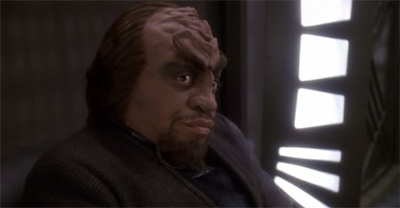
Today is a good day to lawy(er)…
In its own way, the courtroom is just a more civilised battlefield. As Dean Robert Gilbert Johnston and Sara Lufrano argue in The Adversarial System as a Means of Seeking Truth and Justice:
Litigation accomplishes the purpose of truth seeking by employing the adversarial system. The adversarial system is based on the assumption that the truth of a controversy will best be arrived at by granting the competing parties, with the help of an advocate, an opportunity to fight as hard as possible. Few systems rely more on the self-interests of the combatants will clash so as to hone the issues in such a ways as to find the truth, and thus, reach a just result.
In reality, the outcome of such a court case often involves some measure of compromise between the two versions of truth presented by both sides. However, that truth is determined through aggressive competition.
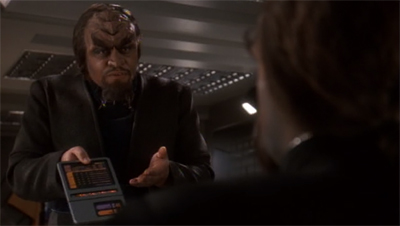
Padd-ing out his arguments…
(The adversarial legal system of America (and Britain and Ireland) might be contrasted with the inquisitorial system that is more common in civil (rather than common) law jurisdictions. In adversarial systems, the court plays the role of referee in a fight between competing truths; much like T’Pau overseeing the fight between Kirk and Spock in Amok Time. In inquisitorial systems, the court is cast as an investigator unearthing the objective truth on its own terms by probing and exploring.)
Rules of Engagement nods towards the realities of the adversarial system, but never embraces them. “This is not a fight,” Sisko asserts. “It’s the search for the truth.” Ch’Pok responds, “The truth must be won.” However, the episode never lingers on the point, never exploring that distinction. Indeed, the character of Ch’Pok seems like a wasted opportunity. Instead of a warrior applying his skills to a different battlefield, Ch’Pok is portrayed as a sniveling and posing coward who is borderline incompetent.
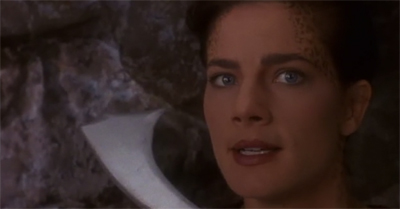
Worf’s isn’t the only neck on the line…
Indeed, most of Ch’Pok’s gambits seem to succeed in spite of his ability, rather than because of it. His decision to argue the case on emotional grounds in front of a Vulcan is gloriously wrong-headed, but the episode decides to allow it. Later on, Ch’Pok goads Worf into attacking him in the most transparent manner possible. Worf’s outburst doesn’t feel earned; the character has always been hot-tempered, but Ch’Pok is so clumsy in his attempts to bait Worf that seeing the character rise to that is disappointing.
It could be argued that Ch’Pok is another example of Deep Space Nine‘s efforts to deconstruct the idea of Klingon honour, suggesting that the idea of Klingons as honourable warriors is a grand illusion. The Way of the Warrior revealed that “there is nothing more honourable than victory.” With his underhanded tactics and sniveling demeanour, Ch’Pok could be read as just another example of that self-serving hypocrisy. Ch’Pok is not honourable or brave, instead presented a poseur.
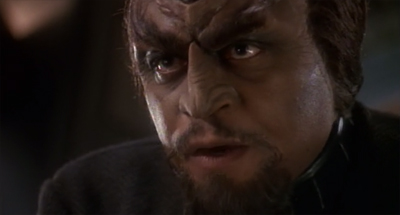
“J’accuse, Monsieur Worf!”
Of course, Ch’Pok is also presented as a stereotypical lawyer. Ch’Pok is underhanded and deceitful, manipulative and cynical; he is not particularly interested in serving the truth as he is in manipulating the truth to serve him. Ch’Pok is a walking cliché in a way that undercuts any potential insight that he might offer into Klingon culture. It would take the franchise almost a decade to really explore that fertile territory with the introduction of Kolos in Judgment, an episode that offers an interesting glimpse at life outside the warrior caste.
Perhaps the most notable aspects of Rules of Engagement are the stylistic touches that decorate the narrative. The episode is directed by LeVar Burton, one of the franchise’s most underrated directors. For all that Rules of Engagement struggles with plotting and characterisation, it looks impressive. The teaser is one of the most effective sequences in the episode, inviting the audience into Worf’s nightmare; the vision of a massacre on board a Defiant littered with the dead bodies of Klingon children. The narrative never quite measures up to that.
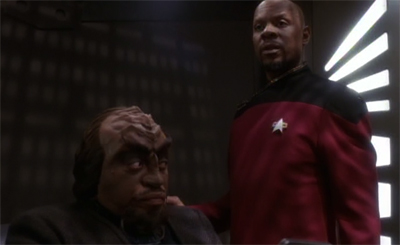
“I know the budget couldn’t stretch to another Klingon guest star, but I’m not sure you should really call the prosecutor as a witness…”
Similarly, the decision to have the character break the fourth wall during their testimony helps to distinguish Rules of Engagement from the franchise’s other courtroom episodes. It is a very novel approach, particularly for a franchise as visually conservative as Star Trek. However, these clever stylistic touches cannot entirely compensate for a messy script. Ch’Pok reflects at one point that the Federation’s legal system “emphasises procedure over substance, form over fact.” The same could be said of the episode.
Nevertheless, Rules of Engagement is an important episode, both for Deep Space Nine and for genre television going forward. It marks the introduction of David Weddle and Bradley Thompson to the world of television production. The duo would freelance on the fourth and fifth seasons, contributing a number of scripts. At the start of the sixth season, they would join the writing staff as story editors. After the end of Deep Space Nine, the pair would work with Ronald D. Moore on Battlestar Galactica. They would enjoy a long and varied career in television.

“That’ll Ch'(Pok) ‘im…”
Their involvement with the show came about by chance, a by-product of Ira Steven Behr’s love affair with classic Hollywood. Weddle had written a biography of Sam Pekinpah, which had caught Behr’s eye. As Weddle explains:
Ira Behr, who was the show runner and Executive Producer of Star Trek: Deep Space Nine, was a huge Peckinpah fan. He loved my book and invited me to lunch at Paramount and took me for a tour of the DS9 sets. Being a shameless opportunist, I asked if I could pitch story ideas to him. He said yes and sent me a three-foot stack of scripts and story material. I had never watched DS9, so I called my friend, Bradley Thompson, who was a huge Science Fiction buff and Star Trek fan and asked if he wanted to try and sell a story to the show with me. The first time I sat down and watched a DS9 episode, I had no idea what was going on because it was such a dense alternate universe. But Brad and I studied the show for months. Eventually we sold a story to Ira. He let us come in while the staff outlined the script and participate in the process. Ron Moore wrote the teleplay for that episode, Rules of Engagement. We sent a note to him afterwards telling him how much we admired his teleplay and he sent us all of the production revisions, so we could study them.
It is a great story, one that demonstrates just how deeply Behr’s aesthetic had permeated Deep Space Nine. (Rules of Engagement is not the first result of Behr’s Pekinpah fixation; Shakaar writer Gordon Dawson had worked with Pekinpah and had given Behr his first job.)

Courting controversy…
According to Bradley Thompson, the development of Rules of Engagement was a learning process for the duo, one that taught them a lot about how the industry was supposed to work:
Under Ira Steven Behr, Deep Space Nine turned us from talented wannabies wet behind the ears into professional television writers. There was no better way to learn this craft than by watching Ron Moore, Ira, Rene Echevarria and Hans Beimler crack stories, then deal with budget, cast, and production rewrites. They were awesome.
Ron wrote the teleplay for our first story, Rules of Engagement. We sat in the room and saw them turn the show from a story loosely based upon the Vincennes incident into a “Deep Space Nine.” Then Ron sent us every draft and every revision he did on the show. It taught us constant honing process that it takes to write good TV.
It demonstrates just how fantastic Star Trek was as an incubator for young writers, and just how far the ripples from the franchise could shed; genre television would be shaped by writers who cut their teeth on the shows.
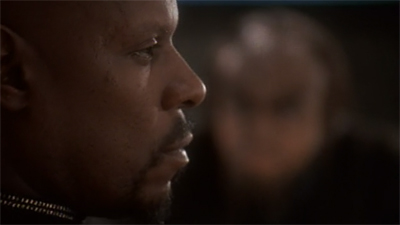
Trial and error…
This is particularly true of the fourth and fifth seasons of Deep Space Nine. Appropriately enough, given its setting, the show would serve as a “stopping off” or “passing through” point for some of the great television writers of the twenty-first century. Jane Espenson had written Accession during a quiet phase in her already developing career, while Bryan Fuller would break into television by pitching The Darkness and the Light. Michael Taylor scripted The Visitor, with help from René Echevarria. Lisa Klink started with Hippocratic Oath.
None of these writers stuck around. Espenson got jobs elsewhere. Klink, Fuller and Taylor all found staff jobs on Star Trek: Voyager. In some respects its frustrating that – of all these talented and diverse writers passing through the fourth and fifth seasons – Weddle and Thompson should be the ones to actually join the staff and make the most significant contributions to the mythos of Deep Space Nine. (This is particularly frustrating when Ronald D. Moore complains about how Fuller and Taylor were treated on Voyager.)
Weddle and Thompson would go on to become massively influential writers in genre television, but it is hard not to wonder how things might have been different if Jane Espenson or Bryan Fuller had been convinced to join the staff instead. Both cast long shadows over contemporary television, and Fuller has cited Deep Space Nine as his favourite Star Trek show and how it inspired him to write for television. It is interesting to speculate on what either of those two writers might have brought to the table in the show’s final couple of seasons.
(There is also, at the risk of being blunt, the fact that Weddle and Thompson are the most inconsistent of the major Deep Space Nine writers. They are responsible for great episodes like Business as Usual, Inquisition and Faith, Treachery and the Great River, but they are also responsible for The Assignment, Sons and Daughters, The Reckoning, Time’s Orphan, Prodigal Daughter and Extreme Measures. The duo are perhaps most responsible for the pah-wraith plot element running through the final two seasons, the clunkiest element of the long-running arc.)
Rules of Engagement is one of the weaker episodes of the fourth season, arriving at a point in a twenty-six episode season where everybody is a little exhausted and on the verge of collapse. Indeed, Rules of Engagement ushers in what is perhaps the weakest stretch of the season. (With one very notable exception.) Nevertheless, even though Rules of Engagement doesn’t work, it is visually intriguing and effectively put together. It just feels – to paraphrase Ch’Pok – like form over substance.
Filed under: Deep Space Nine | Tagged: bradley thompson, david weddle, deep space nine, extradition, Honour, klingons, law, star trek, star trek: deep space nine, trial, Worf |




















In your discussion about courtroom episodes it is intesting that you left out the first duty, one of star trek’s best courtroom dramas in my opinion. After all in that episode, the people accused are guilty, which as you point out is rare. I also thought the episode where O’brien is put on trial in Cardassia is good though that is more of a species study than a courtroom drama.
I very much second this. “First Duty” was excellent. TNG’s “The Drumhead” is also a great episode. It’s partly about McCarthyist types of inquisitions, but also very much a courtroom drama.
I forgot about Drumhead, but it truly is an excellent episode. Worf buying into the paranoia and Picard’s speeches, especially the final one, are some the best moments in Star Trek.
Worf buying into the paranoia is a fantastic touch I’m not sure they would have gotten away with even a single season earlier. A sign of Star Trek going a bit bolder, as it were.
Also a good spot! And an underrated classic in the “Star Trek as allegory” sweepstakes.
Good spot. Slipped my mind entirely! And you’re right about it subverting expectations, which is the luxury of not having Wesley around on a week-to-week basis any longer.
The production staff were none too thrilled with Rules of Engagement either. What with the show breaking down the fourth wall (a neat trick we wouldn’t see again until In the Pale Moonlight) they thought they were being really clever with the episode. But what they neglected to do was make Worf the focus of it. There is scene after scene with Worf just sitting there in the courtroom looking so stoical forcing Avery Brooks and Ron Canada to do all the heavy lifting.
They made the same mistake with the S1 episode Dax where Terry Farrell was forced to sit through each scene and quietly act as if the shadow of a great atrocity hung over her. I don’t think introverted works on Star Trek shows. And its DS9 pushing the reset button too (rather than Voyager for a change) where no lives are lost and Sisko laying it out for us in case we missed the point. But I don’t know if I completely agree with Sisko that Starfleet doesn’t endanger it’s civilians. Why else would they have families on Starfleet’s flagship? Even Picard admitted that was a questionable policy.
I’d say The Measure of a Man was about halfway through TNG’s second season Darren rather then the end but I still liked S2 a great deal more then S1. It puts a foot wrong here and there but the episodes that did work showed that the writers were beginning to fathom out how to write Star Trek for a modern audience, just not on a weekly basis yet.
Yep, the ending is INCREDIBLY convenient, and there’s also a real “have your cake and eat it” attitude to Sisko’s whole “… but if it hadn’t been…” self-righteous spiel. Basically, Worf is only not a war criminal by virtue of chance rather than character, which is a really uncomfortable note on which to close an episode.
Ive been rewarding the fourth season this month and tthe thing that strikes me is that they’re going out of their way to give Worf an alien perspective. Having him attempt to kill Kurn, when he almost killed Kor, his anger issues here – he’s way more edgy than he ever was on TNG
There’s a very credible argument to be made that Deep Space Nine really went out of its way to emphasise Worf as an outsider in a manner even beyond The Next Generation, which touched on it occasionally but seemed to always believe that he was a Starfleet officer underneath the occasional angst.
I think it’s a good call, because it helps establish Worf as alien in the same way as Quark, Garak or even Odo. These outsiders who are both exiles from their own people and not entirely comfortable surrounded by humans.
I always laugh at Avery Brooks’ really hammy “ISN’T IT POSSIBLE?” spiel. I wonder if he read the material and decided to chew the scenery in order to compensate for its thinness. What better way to show conviction in material that makes absolutely no sense than to wildly overplay it? “They won’t be impressed with the words I’m saying, but maybe they’ll be impressed with the passion!”
To be fair to Brooks, you could never say that he phoned it in.
Generally, even in episodes featuring other characters (particularly in the later years) there’s a small scene where you notice Avery Brooks. His duet with Odo from “His Way” comes to mind. It might even be my favourite scene of the episode.